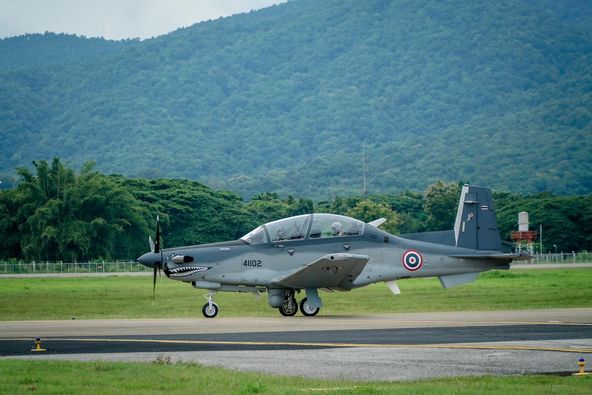The Royal Thai Air Force (RTAF) recently achieved a significant milestone with the introduction of the Beechcraft AT-6TH Wolverine light atack aircraft into operational service. On October 1, 2024, Squadron 411, Wing 41 at Chiang Mai celebrated the first training flight of its AT-6TH aircraft, tail number “41102,” coinciding with the anniversary of Wing 41’s founding. This flight marks the culmination of months of preparation, following the arrival of the first two AT-6TH Wolverines, serial numbers “41101” and “41102,” which officially joined Squadron 411 on July 16, 2024. A special welcoming ceremony for the aircraft was held, attended by media and local students. The RTAF’s acquisition of the AT-6TH Wolverines is part of a broader strategy to modernize its light attack capabilities. The procurement, valued at $143 million, was announced by Textron Aviation Defense LLC on November 14, 2021. The contract includes eight Beechcraft AT-6 Wolverine aircraft, ground support equipment, spare parts, and training, establishing Thailand as the first international customer for the U.S. Air Force’s latest light attack platform. The AT-6TH program aligns with the RTAF’s 10-year Purchase and Development (P&D) Plan and supports the Royal Thai government’s S-Curve 11 strategy, aimed at enhancing the domestic defense industry and fostering collaboration between Thai and foreign companies.

The delivery of the AT-6TH Wolverine light atack aircrafts involved a complex logistics process. The first two aircraft arrived in Thailand by sea in May 2024, entering a Final Reassembly Program at the Thai Aviation Industries (TAI) facility in Takhli District, Nakhon Sawan Province. Located near Wing 4 Takhli, this facility will handle the assembly of the remaining six aircraft, with all units expected to be delivered by February 2025. The incorporation of the AT-6TH into Squadron 411 is anticipated to reach Initial Operating Capability (IOC) soon, as the RTAF completes initial training exercises with the new platform. The introduction of the AT-6TH Wolverines complements the RTAF’s existing fleet of Beechcraft T-6TH Texan II trainers. The T-6TH fleet, comprising 12 aircraft, was delivered to the RTAF Kamphaeng Saen Flying School in 2023. Both the T-6TH and AT-6TH share a common platform, enhancing training-to-combat transition for RTAF pilots and providing flexibility in fleet management. With the AT-6TH Wolverine program, the Royal Thai Air Force is enhancing its light attack capabilities, while contributing to the growth of Thailand’s aerospace industry. As the RTAF continues to integrate this new capability into its operations, it underscores the strategic importance of the Thai-U.S. defense relationship and positions Thailand as a leader in modern airpower within the region.

The AT-6TH Wolverine, designed by Textron Aviation Defense LLC, combines advanced technology with the proven heritage of the T-6 Texan II. Powered by a 1,600hp turboprop engine, it boasts a maximum speed of 858 km/h (316 knots), a service ceiling of 9,949 meters (31,000 feet), and a range of 3,194 km (1,725 nautical miles). With a payload capacity of 1,864 kg (4,110 lbs), the aircraft is equipped for a range of missions, including counter-insurgency and countering violent extremist organizations (C-VEO). Its WESCAM MX-15Di electro-optic/infrared (EO/IR) camera system, mounted under the fuselage, enhances reconnaissance capabilities, while its arsenal includes GBU-12 Paveway II 500 lb laser-guided bombs, Hydra 70 air-to-surface missile pods, an FN HMP-400 .50-cal machine gun pod, and AGM-114 Hellfire missiles. The integration of the AT-6TH Wolverines into the RTAF is a key component of the Thai-U.S. defense partnership, promoting interoperability and joint training. This partnership is further strengthened by the ongoing training programs facilitated by Textron Aviation Defense. In early 2024, eight RTAF pilots completed advanced training at Textron’s Wichita, Kansas facility, focusing on Flight Instructor and Test Pilot courses. These pilots have since returned to Thailand to continue domestic training operations. Additionally, maintenance training for RTAF personnel commenced in 2023, ensuring that local expertise supports the new fleet.













